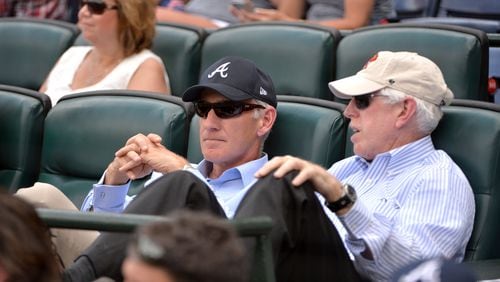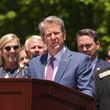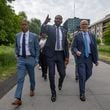Alex Anthopoulos was afforded his first opportunity recently to travel to Colorado and meet with the corporate owners of the Braves. It turns out they had faces and voices and human organs and everything, and they didn’t look at him up and down and ask, “Are you here for our lunch order?”
“They wanted to know about the team,” said Anthopoulos, the Braves’ general manager. “They wanted me to know about winning. They didn’t ask me about payroll or how much money are we going to save. It was: Where is this team? Where are we headed? How soon are we going to win? The word ‘wins’ comes up a lot. My sense walking in was people were sick of the losses.”
You can go one of two ways here:
1) Feel comforted in a warm blanket of serenity.
2) Call BS and then fall on the floor laughing, as if someone just passed a rumor that Mr. Potter was opening a soup kitchen.
There are a lot of things to like about the Braves’ future, at least potentially. They have young talent that can grow into core roster players or be used as trade assets. They have a significant fan base that has been waiting for success again. They have a new general manager with a fresh perspective who has had some level of success elsewhere. Their stadium is attached to a team-owned commercial real estate venture. They’re owned by a company, Liberty Media, that has $42 billion in assets.
So when do the Braves begin to share the wealth?
Because despite a $124 million revenue increase in 2017, Liberty Media/Braves chose not to increase the team's payroll this season. Actually, it dropped. Their opening day 25-man roster came to less than $80 million in payroll. Factoring in "dead money," most caused by acquiring -- and soon after, dumping -- Adrian Gonzalez and Scott Kazmir in the Matt Kemp trade, their full payroll comes to about $116 million. That's about $10 million less than the Braves' payroll a year ago, less than half that of the Boston Red Sox ($235 million), less than Kansas City, less than Minnesota and in the bottom third of the major leagues.
At this point, we should remember one of the Braves’ primary public selling points of their move to the suburbs was their ability to generate revenue from leasing office and retail space, which in turn would be used to support the team, as in player payroll.
When members of the Braves' upper brass – chairman Terry McGuirk, executives Mike Plant and Derek Schiller and Anthopoulos – met with three Atlanta Journal-Constitution staff members on Tuesday, the company line was that ultimately the revenue spike will feed a payroll increase. But this season, the Braves say, their financial focus is on paying down debt (construction loans) and acclimating to their increased expenditures.
Should that be the team’s problem?
I’m not suggesting this was the season for the Braves to go out and buy a bunch of players. Anthopoulos is still evaluating the roster and prospects he inherited, so there’s uncertainty what the major league roster needs.
But this is sports. It should be about winning. It should be about an owner doing everything possible to put the best product on the field, and that generally means spending money.
Moving forward, the Braves’ ability to win can’t be tied to whether Comcast, the Omni Hotel and Antico pizza are behind on their payments.
Schiller, who has overseen business and sales, acknowledged that season ticket sales dropped after the first year at SunTrust Park. Scandal and a front-office tear down following a third-consecutive 90-loss season will do that. But if the Braves don’t start winning, and soon, attendance will continue to drop, and it follows so will foot traffic in adjacent restaurants. So what happens then?
Liberty Media has no excuses. Not now, with $42 billion assets. Certainly not after this season, when four players (Gonzalez, Kazmir, Nick Markakis, Brandon McCarthy) who total $54 million in 2018 salaries fall off the ledger.
The company should not be given the benefit of the doubt because it has never appeared to be emotionally invested. Spreadsheets aren’t passionate. Anthopoulos’ previous comments notwithstanding, Liberty Media is an absentee owner that rarely says anything publicly about the Braves outside of a quarterly shareholders report.
That’s not quite the same as Falcons owner Arthur Blank, whose joy and anguish are on display every game day. We can see it. He has a face. He has a pulse.
A reminder: Blank also is a self-made billionaire. He therefore is no less concerned about the bottom line than Liberty Media.
McGuirk said the Braves have “cleared the deck for next year” in the payroll area.
Anthopoulos reiterated previous comments he made in January: His success will not be defined by organizational prospect rankings but by the major league team's record.
“I love our prospects. I love our affiliates. But people don’t walk through these doors to ... know about the prospects in Rome and Gwinnett,” he said. “It’s 25 guys who drive this whole place.”
Referencing SunTrust Park, he said, “We’ve got a beautiful house. We need to get some people living in it.”
Those people will need to be paid.
That means somebody at the top has to care.
Also see:
• Podcast: Fresh "We Never Played The Game" podcast on McGuirk, Braves' future
• Opener: Home runs? Comeback? Braves open with a miracle win
• McGuirk: Terry McGuirk: Coppolella's exit was like Braves cutting out 'cancer'
Listen to the, "We Never Played The Game" podcast. Check out the podcast show page at AJC.com/sports-we-never-played-the-game. Subscribe on iTunes or, Google play, Stitcher, TuneIn, or listen from the AJC sports podcasts page or the WSB Radio on-demand page.
About the Author






